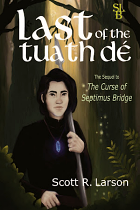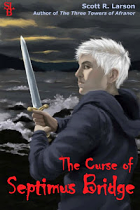Time and again
After compiling my list of ten essential time travel movies, it seemed only right to follow up with a list of essential time travel TV shows.
Some of these eight TV series are specifically about people traveling backward or forward in time. In some cases, time travel occurs in every single episode. In one case, time travel occurs frequently but not necessarily every episode. In a couple of other cases, the show was not about time travel, but time travel occurred in one or two stories. And in one case, time travel occurred exactly twice, once in the pilot and then once in a midseason reboot.
Most of these series fall squarely into the sci-fi genre, and all can be considered at least partly sci-fi. One can arguably be considered at least as much fantasy as sci-fi. Another was definitely gothic supernatural. Two of these were sitcoms with laugh tracks. One was essentially a soap opera.
These are the television shows that come to my mind when I think of time travel on the small screen. Their original airings were fairly evenly divided across TV networks: two each for ABC, NBC and the BBC. One was on CBS, and one bounced from a virtual network called PTEN to cable channel TNT. One lasted only 26 episodes. Another clocked well over a thousand. One is currently airing in multiple countries as this is being written. Another is due to return before the end of the year. I have listed them in order of their debut date. It is interesting that fully half of them first aired in the same year, 1966. Of those, three of them premiered within four days of each other, in September. Make of that what you will.
• Doctor Who (BBC, 675 episodes aired to date, 1963-present): As I asserted in my movie list, this is the granddaddy of time travel on screen, any screen. Next year this worldwide cult favorite will be celebrate 50 years on TV. It hasn’t run exactly continuously during that half-century, and it nearly seemed to have expired after 1989 when new episodes on BBC ceased. The saga returned in a 1996 TV movie and then lapsed again until a reboot in 2005 made it a bigger hit than ever. The Doctor’s ability to travel through time was never made into anything more complicated than the fact that he had a magic telephone box (but the word magic was never used and there was some explanation that the TARDIS’s appearance as a phone box was illusory and simply stuck in that mode). The show’s original mandate was educational, to teach kids about history. But it pretty much has always been a monsters-and-aliens adventure show. Time travel (and space travel) are just a means to get the Doctor and his companions in the middle of new adventures. Only in the 21st century has Doctor Who been more interested in the implications of how time travel could change the course of history.
• Dark Shadows (ABC, 1,225 episodes, 1966-1971): This was a soap opera about a creepy family with creepy mysteries. But as time wore on, supernatural elements were introduced. After the character of Barnabas the vampire was firmly established, the writers used time travel as a means to tell his backstory. Governess Victoria Winters found herself back in the 18th century as the result of a séance. That storyline proved popular and more time traveling plots were introduced (as well as detours into parallel universes), usually with Barnabas and his partner in crime Dr. Julia Hoffman as the travelers. If Doctor Who’s time travels were essentially magic, Dark Shadows’s were even more explicitly so. The show’s original time travel story was more or less repeated two decades later in a short-lived NBC primetime reboot of the series.
• Star Trek (NBC, 79 episodes, 1966-1969): The classic Gene Roddenberry series was not a show about time travel, but some of its most memorable episodes (“The Naked Time,” “Tomorrow Is Yesterday,” “The City of the Edge of Tomorrow,” “Assignment: Earth” and “All Our Yesterdays”) involved time travel, usually bringing some or all of the crew to earth. Time travel also figured in many episodes of the subsequent Star Trek spinoffs (notably Star Trek: The Next Generation’s “Yesterday’s Enterprise,” in which the ill-fated Tasha Yar got to have a more fitting death) and several of the movies.
• The Time Tunnel (ABC, 30 episodes, 1966-1967): This was a short-lived weekly adventure show created by disaster/scifi impresario Irwin Allen. In one of those accidents that plague TV laboratories, two young handsome scientists are trapped in a machine that randomly sends them to a different time and place each week. One was played by James Darren, then best known for playing Moondoggie in the Gidget movies. The other was Robert Colbert, who had a couple of appearances as Brent Maverick on Maverick. Eye candy for young boys was provided by concerned fellow scientist Lee Meriwether, who had recently become the second Catwoman to Adam West’s Batman (on the big screen). Because the series shared Irwin Allen’s penchant for over-reliance on formula, it was not particularly imaginative or creative. But there was something about the notion of a time tunnel that seized the imagination.
• It’s About Time (CBS, 26 episodes, 1966-1967): Even more short-lived than The Time Tunnel, this was a sitcom by Sherwood Schwartz, who would have more impact with Gilligan’s Island and The Brady Bunch. The setup was that two astronauts (played by Frank Aletter and Jack Mullaney) somehow wind up back in a Flintstone-esque Stone Age, complete with dinosaurs. (A conceit of comic books has long been that orbiting the earth too fast sends you back in time.) The Fred and Wilma characters were played by Joe E. Ross and Imogen Coca. When the shtick was seen not to be working, the writers flipped it and had the astronauts get back home, bringing their caveman friends back with them. But it still wasn’t funny enough to avoid cancellation. Still, like most Schwartz shows, the theme song was catchy.
• Red Dwarf (BBC, 55 episodes aired to date, 1988-present): What this cult UK series lacks in quantity it more than makes up for with longevity. Series ten is reportedly in the can and will start airing this autumn. Although it can be considered a sitcom, it is light years away from the above Sherwood Schwartz entry. The humor and stories in the saga of the titular deep space mining ship lean more in the dark Douglas Adams direction. For example, in the very first episode a crew member (Dave Lister) awakens after millions of years in stasis to find that the rest of the crew are long dead due to a radiation accident. This raises all kinds of philosophical and metaphysical questions that wouldn’t be out of place in a Samuel Beckett play. In fact, the continuing hell created for themselves via continual cross-torture by Lister and his nemesis Arnold Rimmer (a hologram of the deceased original) is not unlike Jean-Paul Sartre’s existential play Huis Clos. Series creators Rob Grant and Doug Naylor mined endless laughs by playing on geek fanboys’ knowledge of sci-fi in general and the work of Adams in particular. Consequently, various forms of time travel figured in some of the wildly hiliarious plots. Among its cultural contributions has been the mainstreaming of the word smeghead. An American version was attempted in 1992, an idea which in itself is so perversely funny that it borders on self-mockery.
• Quantum Leap (NBC, 97 episodes, 1989-1993): Updating the idea of The Time Tunnel, Donald P. Bellisario came up with this weekly series that had scientist Scott Bakula leaping into a different time period each week. The twist was that the literally named main character, Dr. Sam Beckett, arrived in someone’s body and had to assume that person’s identity. This presented a nice acting challenge for Bakula, and really made the show more of a drama anthology than a sci-fi series. Comic relief was provided by an astrally projected sidekick in the form of wise-cracking Dean Stockwell as Admiral Al Calavicci. The series had a respectable five-year run and received a nice homage last year in Duncan Jones’s brilliant Source Code.
• Babylon 5 (PTEN/TNT, 110 episodes, 1994-1998): Like Star Trek, this was a show about outer space. Creator J. Michael Straczynski made a point of hewing as close to possible to the plausible and respecting the known laws of physics, so time travel was not something that came up—with one or, arguably, two exceptions. In the first season episode “Babylon Squared,” the titular space station’s predecessor (Babylon 4, natch, which had mysteriously disappeared without a trace) reappears. It has traveled forward in time. Equally perplexing, a future version of Commander Jeffrey Sinclair (Michael O’Hare) also makes an appearance. In a beautiful example of carefully planned scripting, the whole thing paid off in spades two years later in the two-part episode “War Without End,” in which the events of “Bablyon Squared” are finally explained when Sinclair travels back in time two years. This is a spectacular example of how a time travel story can be done right.
-S.L., 12 September 2012
If you would like to respond to this commentary or to anything else on this web site, please send a message to feedback@scottsmovies.com. Messages sent to this address will be considered for publishing on the Feedback Page without attribution. (That means your name, email address or anything else that might identify you won’t be included.) Messages published will be at my discretion and subject to editing. But I promise not to leave something out just because it’s unflattering.
If you would like to send me a message but not have it considered for publishing, you can send it to scott@scottsmovies.com.





















